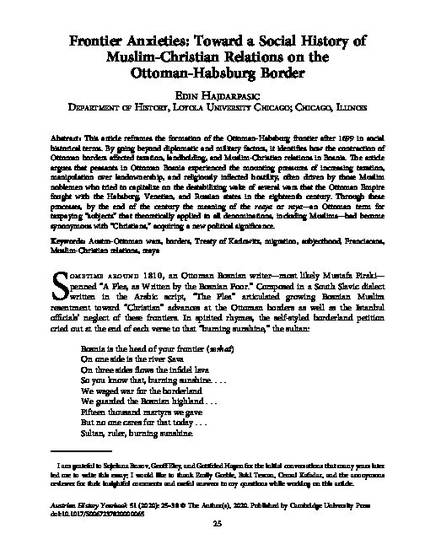
Article
Frontier Anxieties: Toward a Social History of Muslim-Christian Relations on the Ottoman-Habsburg Border
Austrian History Yearbook
(2020)
Abstract
This article reframes the formation of the Ottoman-Habsburg frontier after 1699 in social historical terms. By going beyond diplomatic and military factors, it identifies how the contraction of Ottoman borders affected taxation, landholding, and Muslim-Christian relations in Bosnia. The article argues that peasants in Ottoman Bosnia experienced the mounting pressures of increasing taxation, manipulation over landownership, and religiously inflected hostility, often driven by those Muslim noblemen who tried to capitalize on the destabilizing wake of several wars that the Ottoman Empire fought with the Habsburg, Venetian, and Russian states in the eighteenth century. Through these processes, by the end of the century the meaning of the reaya or raya—an Ottoman term for taxpaying “subjects” that theoretically applied to all denominations, including Muslims—had become synonymous with “Christians,” acquiring a new political significance.
Disciplines
Publication Date
May, 2020
DOI
doi.org/10.1017/S0067237820000065
Citation Information
Edin Hajdarpasic. "Frontier Anxieties: Toward a Social History of Muslim-Christian Relations on the Ottoman-Habsburg Border" Austrian History Yearbook Vol. 51 (2020) p. 25 - 38 Available at: http://works.bepress.com/edin-hajdarpasic/22/
Creative Commons license

This work is licensed under a Creative Commons CC_BY-SA International License.